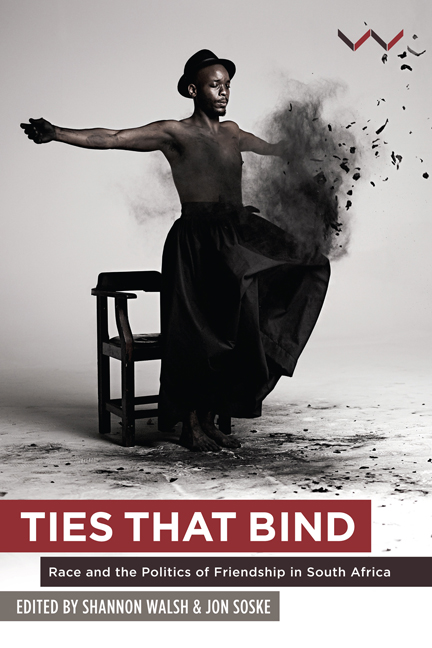Book contents
- Frontmatter
- Contents
- List of Figures
- Epigraph
- Fanon's Secret
- 1 Thinking About Race and Friendship in South Africa
- 2 With Friends Like These: The Politics of Friendship in Post-Apartheid South Africa
- 3 Bound to Violence: Scratching Beginnings and Endings with Lesego Rampolokeng
- 4 Afro-Pessimism and Friendship in South Africa: An Interview with Frank B. Wilderson III
- 5 The Impossible Handshake: The Fault Lines of Friendship in Colonial Natal, 1850-1910
- 6 The Problem With ‘we’: Affiliation, political Economy, and the Counterhistory of Nonracialism
- 7 Affect and the state: Precarious Workers, The Law, and the Promise of Friendship
- 8 ‘A Song of Seeing’: Art and friendship Under Apartheid
- 9 ‘Friend of the Family’: Maids, Madams, and Domestic Cartographies of Power in South African Art
- 10 Corner Loving: Ways of Speaking about Love
- 11 Kutamba Naye: In Search of Anti-Racist and Queer Solidarities
- 12 The Native Informant Speaks Back to The Offer of Friendship in White Academia
- Acknowledgments
- Contributor Biographies
- Index
12 - The Native Informant Speaks Back to The Offer of Friendship in White Academia
Published online by Cambridge University Press: 21 April 2018
- Frontmatter
- Contents
- List of Figures
- Epigraph
- Fanon's Secret
- 1 Thinking About Race and Friendship in South Africa
- 2 With Friends Like These: The Politics of Friendship in Post-Apartheid South Africa
- 3 Bound to Violence: Scratching Beginnings and Endings with Lesego Rampolokeng
- 4 Afro-Pessimism and Friendship in South Africa: An Interview with Frank B. Wilderson III
- 5 The Impossible Handshake: The Fault Lines of Friendship in Colonial Natal, 1850-1910
- 6 The Problem With ‘we’: Affiliation, political Economy, and the Counterhistory of Nonracialism
- 7 Affect and the state: Precarious Workers, The Law, and the Promise of Friendship
- 8 ‘A Song of Seeing’: Art and friendship Under Apartheid
- 9 ‘Friend of the Family’: Maids, Madams, and Domestic Cartographies of Power in South African Art
- 10 Corner Loving: Ways of Speaking about Love
- 11 Kutamba Naye: In Search of Anti-Racist and Queer Solidarities
- 12 The Native Informant Speaks Back to The Offer of Friendship in White Academia
- Acknowledgments
- Contributor Biographies
- Index
Summary
This chapter is a philosophical discussion detailing how the alienation we feel as Black scholars, and the assimilation we have to negotiate as aspiring Black women scholars in academia, reveals a crisis in social science. We see this crisis best displayed through the figure of the native informant. This chapter is about the affective and actual role that we as native informants play daily within an unchallenged white academia. Franco Barchiesi's chapter (this volume) narrates the positionality of Drum magazine journalist Nat Nakasa as participant in the ‘fringe’ or ‘No Man's Land’ in Johannesburg during apartheid, a place where both black and white could interact without directly confronting the dehumanisation of black people. In a similar vein, South African universities inhabit a similar ‘fringe’ positionality. In this sphere, friendship between white and black becomes a space of ‘complicities and intimacies’ tied to the historical matrix of roles that place the native informant as a cultural interpreter before she can be seen as a consumer or creator of knowledge. The social sciences are in a condition of instability that has socially, politically, and economically alienated Black scholars.
Our chapter draws on Windsor S. Leroke's paper ‘“Koze Kube Nini?” The Violence of Representation and the Politics of Social Research in South Africa.’ This article, published in 1994, has been forgotten as it does not fit neatly into the status quo, though it has been cited by a few scholars. Leroke's paper was a critical intervention in a longer history of Black scholars in South Africa contesting and participating in academia. Twenty years after the paper was presented at the Wits History Workshop, the questions it posed have yet to be answered by the social science community in South Africa. The difference this time is that we are directing our questions to Black scholars, including ourselves — as native informants. We use native informant as defined by Shahnaz Khan (2005), as both the research object who is represented, and/or has to learn the skills to represent herself within the framework of white academia.
- Type
- Chapter
- Information
- Ties that BindRace and the Politics of Friendship in South Africa, pp. 288 - 307Publisher: Wits University PressPrint publication year: 2016



